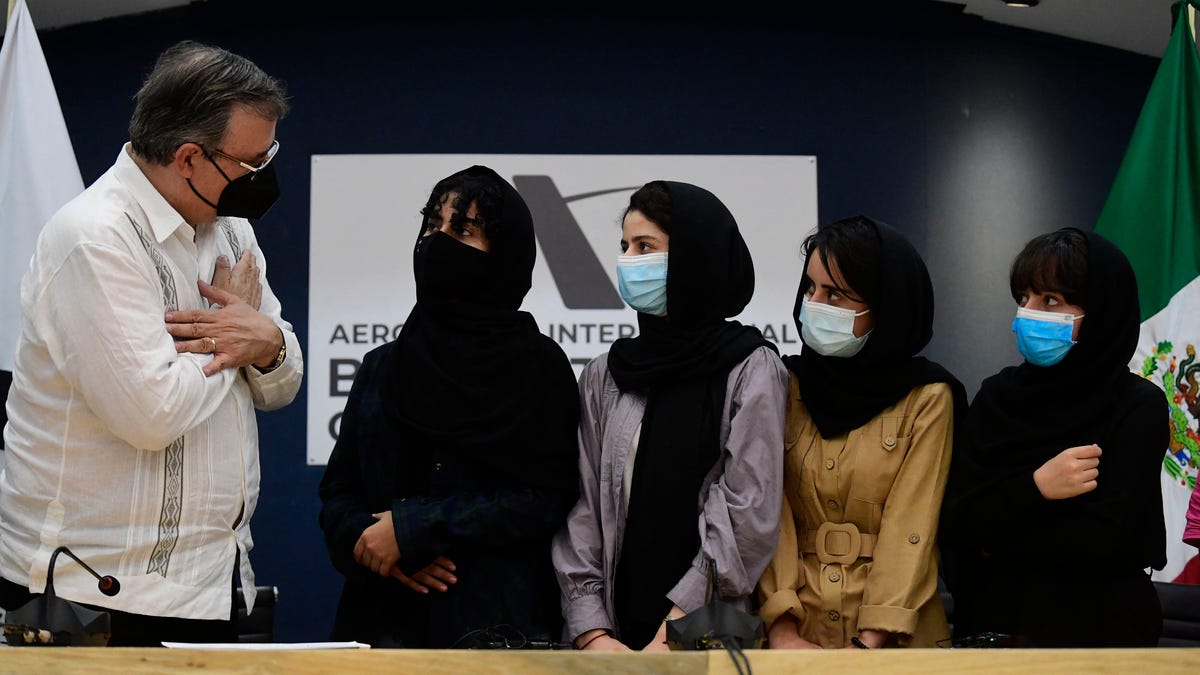More members of Afghanistan's all-girls robotics team flee the Taliban
The girls, who recently developed a low-cost ventilator using old car parts, made global headlines as a symbol of a more progressive Afghanistan.

Marcelo Ebrard, Mexico's secretary of foreign affairs, welcomes members of the Afghan Dreamers all-girls robotics team at the Benito Juarez International Airport in Mexico City.
Five members of the celebrated all-girls Afghan robotics team, which made headlines as a symbol of a more progressive Afghanistan, landed in Mexico on Tuesday after escaping their country in the wake of the Taliban seizing control.
"We give you the warmest welcome to Mexico," the country's Deputy Foreign Minister Martha Delgado told the girls as she greeted them during a news conference at Benito Juarez International Airport in Mexico City. The girls were part of the first group of Afghan refugees to arrive in Mexico. Others on the same 20-hour flight included members of the media who've requested a humanitarian, refugee or asylum visa from the Mexican government.
"Thank you so much," one of the girls said during the news conference. "We would really appreciate it if you have the opportunity to help others too to come to Mexico." As she spoke, the team member sitting next to her became visibly emotional.
Recibimos a las primeras solicitantes de status humanitario en México provenientes de Afganistán , ellas forman parte del equipo de robótica de ese país y defienden un sueño : un mundo con igualdad de género. Bienvenidas!!! pic.twitter.com/Kw0WFtR3Bk
— Marcelo Ebrard C. (@m_ebrard) August 25, 2021
Last week, 10 other members of the team called the Afghan Dreamers landed in Qatar, according to Afghan tech entrepreneur Roya Mahboob, who started the Afghan girls robotics team in 2017. Mahboob founded the Digital Citizen Fund, which runs classes for girls in STEM and robotics.
The work to bring the girls to Doha began on Aug. 12 when Mahboob, DCF founder, and Elizabeth Schaeffer Brown, a DCF board member, asked Qatar for help. Government officials had stayed in touch with the team after hosting it in Doha in 2019.
"The Taliban have promised to allow girls to be educated to whatever extent allowed by Shariah law," Mahboob said in a statement obtained by The New York Times. "We will have to wait and see to what that means. Obviously, we hope that women and girls will be allowed to pursue dreams and opportunities under the Taliban, because that is what is best for Afghanistan and in fact the world."
The girls who fled will settle in Qatar to continue their education, Mahboob said, while others plan to stay in Afghanistan, at least for now.
Members of the Afghan all-girls robotics team work with their robot in the practice area between events at the 2017 FIRST Global Challenge in Washington, DC.
On the Sunday the Taliban fighters took control of Kabul, all but officially sealing their takeover of the whole country, New York-based international human rights lawyer Kimberley Motley described what the girls were experiencing amid the panic and uncertainty of the Taliban takeover.
"These girls are extremely terrified," Motley told the Canadian Broadcast News. "They're in Herat, where now in the universities, they're turning girls away. They're telling girls, 'Don't come back to the university.' Women are showing up for work and are being turned away. They're seeing this and watching tearfully as their city is crumbling."
The Taliban captured the girls' hometown of Herat, Afghanistan's third largest city and a strategic provincial capital, as fighters approached the capital of Kabul.
Members of the team, who range in age from 12 to 18, have overcome war and other hardships to pursue their love of engineering and robotics and strike a blow for gender equality and national pride.
This CNET video shows them accepting the silver medal for "courageous achievement" at a 2017 international robotics competition. Other teams had four months to build their robots, but the team from Afghanistan, twice denied visas into the US until a late intervention by the Trump administration, had only two weeks to build and ship their ball-sorting bot to Washington, DC.
During the coronavirus pandemic, the team worked on a low-cost ventilator using old car parts. The design, inspired by work on an emergency ventilator out of MIT, is low-tech so it can be replicated around the world with local products. For that contribution the team made Forbes Asia's 30 Under 30 list this year. The list honors trailblazers who exemplify determination, hard work and innovation.
Motley has worked in Afghanistan since 2008, successfully handling criminal and civil cases there. She says she fears for the young roboticists' futures now that Afghan President Ashraf Ghani has fled the country, leaving the Taliban in power and parts of the country in panic and chaos. The girls have expressed a desire to continue their education in Canada, and Motley has been working to make that happen. Their plight has even spawned a Change.org petition calling for their safe resettlement there.
Thank You 🙏 https://t.co/DXuaCg1OnU
— Roya Mahboob (@RoyaMahboob) August 14, 2021
As my CNET colleague Katie Collins reports, Taliban spokesman Suhail Shaheen has taken to Twitter to say Taliban soldiers have been ordered not to enter people's homes and has described reports that soldiers are forcing young girls into marriage as "poisonous propaganda." The story Shaheen is telling on Twitter is at odds both with news reports from the ground in Afghanistan and the fear expressed by Afghan citizens.
"We are deeply worried about Afghan women and girls, their rights to education, work and freedom of movement," the White House said in a statement released Wednesday. "We call on those in positions of power and authority across Afghanistan to guarantee their protection."

